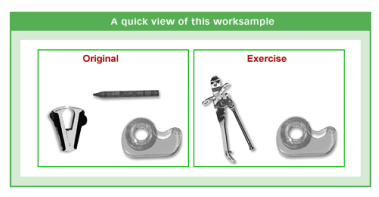Observation is the aptitude of spotting and remembering details, changes, or irregularities. The test was originally designed to help in the selection of factory inspectors. In any field that involves an inspection function, observation can prove useful. Other industries include claims investigation for insurance companies, detective work, scientific research, and safety engineering inspection. There are some other less obvious careers in which observation is a great boon: in art and museum work, and in gardening and horticulture, where distinguishing between different plants is important. The natural ability to notice details and the need for an organized space are essential to succeed and be happy in these careers.
Observation is a driving ability. The experience of noticing things out of place send signals to the brain that can best be equated to “nails on a chalkboard” – the involuntary reaction is a cringe. This is a driving ability because it demands satisfaction. People who for one reason or another ignore this find that they experience unexplained anxiety. Keeping things neat and tidy contributes to their sense of peace and calm. When schedules get busy, the need for quiet in the visual space becomes paramount.

A sample from The Highland Ability Battery Observation portion. The test-taker must describe what has changed about the picture including a change in position, orientation, a missing object, or an added object
A Cultural Example
People from northern European countries tend to have this ability in greater proportion than other regions. This became evident to The Career Profiler, a career coach and personality profiler, when traveling in South America. That is a region of the world filled with many sights and smells and a relaxed society. Sidewalks are squeezed in between buildings and roads in whatever configuration fits. Paint of every age and shade smears a mural across the buildings lining the road. Dirt and trash are cleaned up when necessary but it is mostly not necessary.
In this landscape lives a community of Mennonite Dutch-Germanic peoples. They are known for their pacifistic religious views and industrious nature. In their neighborhoods, streets are wide and straight. Their sidewalks lie an even distance from the road. Grass grows along each side of these walks even though their villages are situated in the Chaco, Paraguay, “the green hell.” The Mennonite hotel is dorm-like, with a plain dining hall. The rooms are bare and spotlessly clean – sterile in comparison to the land in which they live. The rooms are white like the picket fences – a remnant icon of their former homeland in Russia. There too they set up villages that were neat and productive. Even in Russia this stood out in stark contrast to the helter-skelter of the native dwellers in the Ukrainian region of Russia at the time.
It’s been centuries since the Paraguayan Mennonite’s ancestors left Holland. What drove these people to such perfection in streets and buildings? What caused them to keep these neat and tidy traditions in light of the more relaxed cultures into which they moved? Something drove them. Sure you could say their cultural protocols did. But, they had long left the culture in which these protocols were formed. They could long ago have adapted at least some of the culture of their new countries. But they didn’t. This demonstrates that their need for visual orderliness is an internal drive. A drive strong enough to maintain orderliness even in cultural mores diametrically opposed to their own.
Observation in Children
In this cultural example, we can see that the aptitude of orderliness is a powerful thing. Similarly, children with this ability can expect to experience anxiety and even depression. It is an actual need to see or create order in the world. That means that when it is not satisfied, there is a drive from within to find satisfaction for it. That’s why it’s important to know what your aptitudes and driving abilities are so that you can work with them and satisfy them. If you have children, it’s important to know their abilities so that you can accommodate them and help them achieve their greatest potential in those areas.
Ready to find out if you have the observation aptitude? We most strongly recommend The Highlands Ability Battery as an aptitude test. It will provide you with much more information than just your observation score. Get to know yourself and make your life better!








